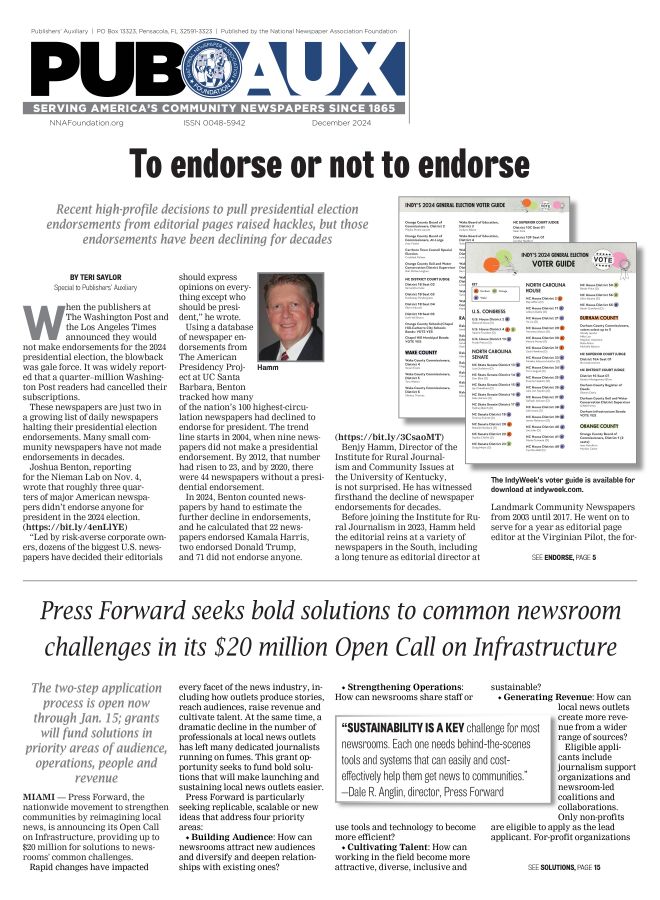USPS Valassis deal undercuts community news
Sep 18, 2012
By Reed Anfinson
President | NNA
They say there is no more dangerous animal than one that is wounded. It protects its life and territory through the pain with dangerous and unpredictable behavior. Reason and long-term self-interest no longer are in play. We are seeing such behavior today from a financially wounded U.S. Postal Service.
Through the first three quarters of its 2011-2012 operating year the Postal Service has reported losses of $11.6 billion—that is more than double its losses of $5.7 billion for the same period in 2010-2011.
During the third quarter it reported losses of nearly $57 million a day!
Now all those losses aren’t attributed strictly to operations. Under a 2006 congressional mandate it is required to make $5.5 billion in annual contributions to is employee retiree health benefits plan. The payments are geared to fund 75 years worth of benefits in just 10 years. For the first time, the Postal Service defaulted on the payment this past August, and that was for a payment that had been deferred from August 2011. Another $5.6 billion payment is due at the end this month.
The Postal Service also has to make more than $1 billion in annual worker’s compensation payments Sept. 30. The actual operating loss for USPS during the first three quarters was more than $1 billion.
There is a simple reason for the Postal Service’s huge mounting losses—the Internet is replacing first class mail for everything from personal letters, to bills, to bill payments. First class mail has been its best net profit service.
Now, to stop a small fraction of financial bleeding, USPS has come up with a scheme to make it a few extra dollars while at the same time hurting a long-time loyal customer.
It proposed offering a special postage discount deal to Valassis Inc. through something called a Negotiated Service Agreement. The sole purpose is to give Valassis deep discounts in its postage costs not offered to newspapers. It gives Valassis the ability to undercut newspapers, taking inserts away, or drive down the cost newspapers charge to the point where they are losing money to carry the inserts.
In exchange for the three-year deal, the Postal Service says it will earn an additional $4.7 to $15.3 million in net revenues. That is at most less than one-third of one day’s losses at USPS.
The commission begins with the presumption that having a federal enterprise competing directly with the newspaper industry is a good thing, but it does not explain how any business can be on a level playing field when competing with its own government.
The mailing contract with Valassis is an unfair deal in which the principal result is to drive down the advertiser’s prices and not necessarily to bring any new mail volume to the Postal Service. Remember, to implement this new deal at a lower price it is taking away the delivery from newspapers which are currently paying a higher postage price.
The deal was approved by the Postal Regulatory Commission, which is under pressure to let the Postal Service do as it wishes to try regain its financial footing. What the commission does not explain is why this goal is in the best interest of either newspapers or the Postal Service. Nor does it take seriously the arguments raised by many that this deal will force more newspapers out of the mail and create a net loss for the Postal Service after the deal kicks in.
What the commission does clearly explain is that it does not think there is a problem with the Postal Service’s draining revenues from newsgathering organizations.
We know that in thousands of communities around this nation that newspapers remain the most vigorous watchdog of government as well as the primary source of community news.
The Founding Fathers recognized that the Postal Service needed to work in a partnership with newspapers to provide citizens with the news fundamental to their ability to make informed decisions. Despite the Internet, TV and radio, newspapers still play this essential role. However, it appears the Postal Service is abandoning this founding principle to compete with rather than support newspapers.
If the Postal Service can get away with this deal, which both NNA and NAA are considering challenging in court, it will establish itself as a “business” which can pick and choose winners. We can guarantee you that this philosophy will eventually mean that service to rural communities, which aren’t in its most profitable service territories, will see a steadily deteriorating delivery of the mail.







